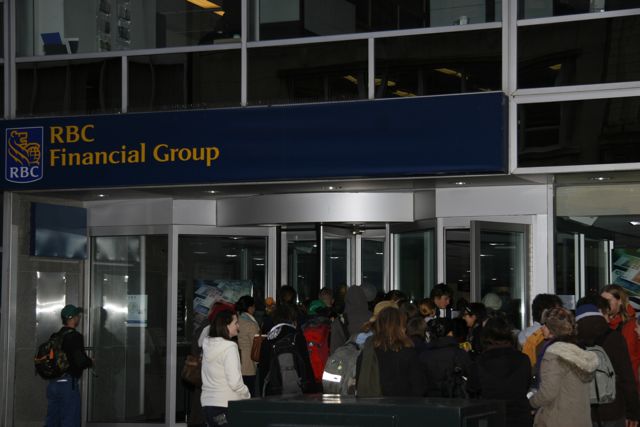Cross-posted from It’s Getting Hot in Here. Written by Maryam Adrangi from RAN Toronto.
This weekend in Ottawa, 100 concerned citizens staged mock deaths at the Royal Bank of Canada, accompanied by chanting and chalk outlines. Following a weekend of activity at Powershift Canada, the action called attention to RBC’s role as the lead financier of tar sands extraction.

The action in Ottawa continues a series of actions performed by RAN Toronto who are lobbying RBC to divest funding from tar sands projects. Tar sands oil has serious environmental, climate and human health impacts. Described by the United Nations Environment Program as one of the world’s top “environmental hot spots,” global warming pollution from tar sands production is three times that of conventional crude oil. Unconventional tar sands oil is derived from lower-grade, difficult and expensive-to-access raw materials, which have enormous consequences for air quality, drinking water and the climate.
To extract tar sands oil requires churning up huge tracts of ancient boreal forest and polluting so much clean water with poisonous chemicals that the resulting waste ponds can be seen from outer space. The health impacts to Alberta’s First Nation communities are severe, with cancer rates up in some communities as much as 400 times its usual frequency. In addition, as this oil spills into the U.S., refinery communities face air and water pollution from tar sands oil, which contains 11 times more sulfur and nickel and five times more lead than conventional oil.

“RBC needs to have higher ethical standards when investing our money. Tar sands development is paving the way for an ecological holocaust and First Nation communities are experiencing a slow industrial genocide” noted Athabasca Chipeywan First Nation member Gitz Crazyboy.
Canada has no regulations to reduce greenhouse gas pollution, and the federal government’s climate change plan would allow total pollution from the tar sands to increase almost 70 percent by 2020. In 2009, the Canadian government cut funding for climate change research and support for renewable energy.
“Climate change, one of the biggest security threats of our time, is something Canada and the United States face together. Extracting and burning oil that sends three times more climate-changing greenhouse gases into the atmosphere than conventional oil puts us all at risk,” said Eriel Deranger Tar Sands Campaigner for RAN.
What can you do? Check out ran.org/tarsands